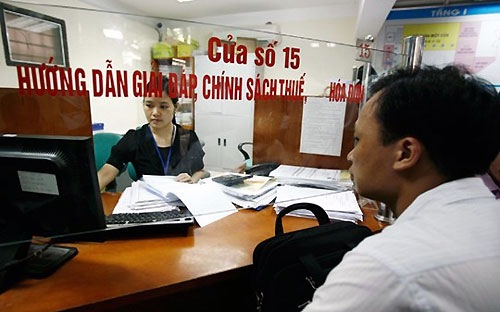The Commercial Law was enacted in 2005 and took effect on January 1, 2006. The Commercial Law was born in the context of Vietnam negotiating to join the WTO, playing a historic mission role in bringing Vietnam into the WTO. After 10 years of implementation, despite achieving significant results, there are still inadequacies that need to be addressed and amended.
On October 16, 2015, in Hanoi, the Ministry of Industry and Trade cooperated with USAID GIG (The Governance for Inclusive Growth Program of the United States Agency for International Development) to organize a workshop to summarize the 10-year implementation of the 2005 Commercial Law, under the chairmanship of Deputy Minister Do Thang Hai.
The workshop was attended by more than 100 delegates from central agencies to ministries and sectors (such as the Ministry of Industry and Trade, the Ministry of Justice, the Ministry of Planning and Investment, and the Ministry of Agriculture and Rural Development), representatives of associations such as the Retail Association, the Advertising Association, VCCI, lawyers, arbitrators, representatives from the Supreme People's Court, law lecturers from universities such as the University of Law, Foreign Trade University, University of Commerce, Judicial Academy, and reporters from newspapers and media outlets across the country.
The workshop took place throughout the day with many discussions and valuable opinions focusing on the direction to amend the Commercial Law, what to add, and what to eliminate due to overlap with the Civil Code.
The workshop commenced with a summary report on the practical implementation of the 2005 Commercial Law by Mrs. Tran Do Quyen, Deputy Director of the Legal Department, Ministry of Industry and Trade, outlining the requirements for completing the provisions of the 2005 Commercial Law and the directions for amendments and supplements to the law. In her presentation, Mrs. Quyen highlighted several key issues for revising the Commercial Law 2005, including:
- Simplifying the concept of traders based on the criterion that traders engage in commercial, profit-making activities.- The concepts of "franchise," "commercial rights" have yet to fully express the distinctive characteristics of franchising, particularly the uniformity and systematization of franchise stores and other indicators.- The regulations on types of sales contracts through the Commodity Exchange also need to be amended to align with international practices.- Regarding the right to trade goods through foreign commodity exchanges, currently, the Ministry of Industry and Trade has no specific regulations on conditions, timelines, and scope of participation in this activity at foreign exchanges. This creates a legal void significantly affecting enterprises' and individuals' rights and interests.- The provisions on temporarily suspending contract performance are unclear, requiring more specific regulations on the grounds, timing of termination of temporary suspension, and the obligations of parties when the grounds for temporary suspension cease to exist.- Inconsistent regulations on penalties and compensation between the Commercial Law and Civil Code could lead to unnecessary disputes during contract execution. The regulation of a maximum penalty rate of 8% of the breached contractual obligation value is considered unreasonable and needs revision.- Promoting commercial activities acts as a bridge to bring Vietnamese goods to remote areas across the country. Some current provisions in the Commercial Law are outdated, necessitating improvements for trade promotion efforts.- The logistics sector currently performs better abroad than domestically, calling for a focal agency for this activity in Vietnam.
The Ministry of Industry and Trade informs that revisions to the 2005 Commercial Law will begin in 2017, with completion slated for submission to the Government of Vietnam in 2018. Additionally, the Ministry is drafting the Foreign Trade Management Law, expected to be submitted to the Government of Vietnam in May 2016.
Mr. Tran Van Dat, Deputy Director of the Department of General Issues on Legal Construction, Ministry of Justice, supports the Ministry of Industry and Trade's view by proposing 21 issues requiring amendments and supplements in the Commercial Law, from its regulatory scope to specific issues such as the concept of traders, warranty obligations, or determining compensation value.
Mr. Tran Huu Huynh, Chairman of the Vietnam International Arbitration Center (VIAC), suggests abolishing numerous contents and even the Commercial Law itself, arguing that much of its content is already governed by other laws, particularly the Civil Code.
For example, the fundamental principles in commercial activities stipulated by the Commercial Law are either already adjusted in the Civil Code and the Consumer Protection Law, such as principles of equality, voluntary execution, and consumer protection, or principles like applying practices, customs, and recognizing the legal value of electronic messages in commercial activities that cannot be considered principles themselves.
Regarding the contracts for the international sale of goods, these provisions in the Commercial Law overlap up to 80% with those in the Civil Code. Moreover, the Civil Code details these with an entire chapter and 111 articles. Therefore, the provisions on such contracts should be excluded from the Commercial Law.
Mr. Huynh also recommends transferring all six articles from Article 28 to 33 on international goods sales contracts to the Foreign Trade Management Law draft, as they primarily pertain to state management.
Similarly, provisions on service contracts, processing, auctioning goods, and bidding could also be governed by the Civil Code or other specialized laws on construction, insurance, credit, advertising, etc., which offer more detailed and specific regulations.
Mr. Huynh also advocates separating the Commercial Law into distinct public and private laws for specialized fields.
Evaluating the practical implementation of the 2005 Commercial Law, lawyer Ngo Viet Hoa, a member of the USAID GIG Project, notes that besides the widely referenced provision on a penalty limit of 8% for breaches of commercial contracts, many provisions of the Commercial Law have "slept" over the last ten years without being referenced or applied, as they are governed by specialized laws. He also mentions that many provisions of the Commercial Law create unnecessary overlaps within the legal system, particularly with the Civil Code. Fundamentally, the Commercial Law is a private law, but its guiding documents mainly handle public relationships. The Commercial Law, in essence, seems to complicate the issue of law application for private relationships.
Mr. Ngo Viet Hoa suggests that when amending it, the approach of the Commercial Law being a general law applicable to all commercial activities should be abandoned. Instead, it should become a specialized law addressing only specific commercial activities.
Mr. Nguyen Tuong, Head of the Representative Office of the Vietnam Logistics Business Association (VLA) in Hanoi, states that as a sector significantly impacted by the 2005 Commercial Law, the definitions of logistics services in this law no longer fit the industry's developments. The business conditions in Decree 140/2007/ND-CP appear outdated seven years after Vietnam joined the WTO.
Some of Vietnam's WTO commitments related to logistics services are ambiguous, leading to different interpretations by relevant ministries and central authorities when guiding domestic enterprises and foreign investors, thereby causing difficulties in logistics services business.
Chairwoman of the Vietnam Retailers Association, Mrs. Dinh Thi My Loan, shares practical concerns: Personal commercial activity management (Clause 1, 8, 9, Article 8 of Decree 39/2007/ND-CP) poses problems and is prone to abuse. Managing through tracking books for oversight and fee collection by authorities is impractical given the constantly changing number of individuals involved in commercial activities. Authorities nearly impossible to conduct continuous checking, leading to opportunities for corrupt officials and tax losses for the state.
Mrs. Nguyen Thi Dieu Hong from VCCI's Legal Department notes that due to such overlap, when applied to specific commercial activities, the Commercial Law is often "forgotten" and specialized legal documents are used instead. Therefore, the Commercial Law should only stipulate distinctive provisions, eliminating those already in the Civil Code and specialized laws.
The Court Science Institute, Supreme People's Court, also finds numerous overlaps between the Commercial Law and the Civil Code, such as sales contracts and asset sales contracts, contracts representing traders and authorization contracts, as well as goods leasing contracts and asset leasing contracts.
Additionally, many provisions between the two laws are contradictory, like the delivery location without an agreement: the Commercial Law sets it at the seller's business location, while the Civil Code sets it at the buyer's headquarters. Similarly, the Commercial Law caps penalties at 8% of the value of the breached obligation, whereas the Civil Code allows parties to determine the penalty without a cap.
Reviewing the problematic and difficult contents of the Commercial Law should be considered in the context of the ongoing research and additional amendments to the Civil Code to ensure appropriate orientation and amendment content.
Some experts also note provisions related to licenses and administrative procedures, such as commercial activities only being conducted when "approved" or "permitted" by competent state authorities, but lacking clarity on licensing conditions and criteria. This not only makes it difficult for enterprises but also leads to situations where state authorities cause unnecessary trouble and bureaucracy.
According to lawyer Nguyen Phu Thang of the Hanoi Bar Association, the current Commercial Law of 2005 is no longer appropriate and requires amendments that ensure transparency, coherence, and rationality.
The Commercial Law lacks transparency, as exemplified by Article 318, which sets a six-month complaint period for goods quantities and a three-month period for goods quality, while civil contracts do not stipulate complaint periods. Thus, exceeding these periods results in losing the right to file a lawsuit, conflicting with the Criminal Procedure Law.
Regarding coherence: commercial sales contracts in both the Commercial Law and Civil Code overlap. The Commercial Law's maximum fine cap of 8% of the breached contractual obligation value is deemed irrational. The purpose of sanctions is risk prevention, hence suggesting the removal of the penalty cap and allowing parties to agree freely.
Regarding rationality: an advanced legal system should protect the honest party, yet the Commercial Law doesn't achieve this, as it stipulates penalty caps, potentially empowering one party to willingly accept the penalty to achieve a larger goal.
Regarding feasibility: many provisions in the Commercial Law are incomplete and insufficient, constantly needing further guidance documents.
Another lawyer believes the Commercial Law is positive in dispute resolution and needs essential amendments for integration but should not blindly adopt foreign laws. The Commercial Law should be based on the Civil Code but maintain its unique characteristics, clear sanctions, and exclude provisions like advertising laws and contract regulations.
 Article table of contents
Article table of contents





.Medium.png)
.Medium.png)
.Medium.png)
.Medium.png)
